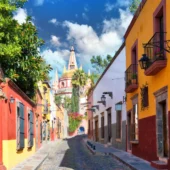Real Estate Buying Guide for San Miguel de Allende
San Miguel de Allende, a UNESCO World Heritage site, offers an attractive blend of rich culture, stunning colonial architecture, and a vibrant expat community. If you’re considering buying real estate in San Miguel, here is a comprehensive guide to help you navigate the process.
1. Understanding the Local Real Estate Market
San Miguel de Allende’s real estate market has boomed in recent years, attracting both international buyers and locals. The demand is high, especially in central areas, leading to a competitive market where prices can range significantly depending on the location, property type, and amenities.
- Popular Areas:
- Centro Histórico: The heart of San Miguel, with colonial homes and cobblestone streets.
- Guadalupe: A growing neighborhood with art galleries and a more local feel.
- Atascadero: Known for larger homes and more spacious living, slightly removed from the center.
- San Antonio: A mix of local and expat communities, slightly more affordable than the center.
- Los Frailes: Suburban-style living with larger lots and modern homes.
2. Legal Framework for Buying Property
Foreigners can buy property in Mexico, but there are specific rules to be aware of.
Buying in the Restricted Zone
San Miguel de Allende is located outside of Mexico’s restricted zone (50 kilometers from the coast and 100 kilometers from international borders), meaning
foreigners can buy property directly in their name without the need for a bank trust (fideicomiso).
Fideicomiso (For Restricted Zones)
If you plan to buy property near the coast or borders, foreigners need to purchase through a fideicomiso, which is a bank-held trust that holds the title of the property on your behalf.
3. Types of Properties Available
- Colonial Homes: Known for their Spanish colonial architecture, including stone walls, wooden beams, courtyards, and terracotta roofs.
- Modern Villas: Luxurious, often with modern amenities like pools and large gardens, these homes cater to a more upscale market.
- Condos and Apartments: Ideal for those looking for a low-maintenance, lock-and-leave property. Many condos come with shared amenities like pools and gardens.
- Land and Lots: There are opportunities to purchase land for development, especially in neighborhoods further from the city center.
4. Key Steps in the Buying Process
1. Define Your Budget and Needs
Consider the type of property you are looking for and set a realistic budget. Prices can range from $150,000 USD for a small apartment to multi-million-dollar estates.
2. Hire a Real Estate Agent
It is highly recommended to hire a licensed local real estate agent who is familiar with the market, local regulations, and has access to listings. An agent will help you find the best options, negotiate prices, and guide you through the purchase process.
3. Make an Offer
Once you find a property you are interested in, your agent will help you make an offer. Offers in Mexico are often made in writing and can include negotiation terms such as price, closing costs, and conditions of the sale.
4. Get a Notary Public (Notario Público)
In Mexico, a
Notario Público is a licensed legal professional who handles the legal aspects of property transfers. They ensure that the sale is conducted according to Mexican law, check the property’s title for any liens, and register the transaction with the Public Registry.
5. Perform Due Diligence
Before proceeding with the purchase, your notary and real estate agent should verify the following:
- Clear Title: Ensure the seller has legal ownership and the title is clear of liens or debts.
- Property Boundaries: Verify the exact size and boundaries of the land.
- Permits and Zoning: Ensure the property is properly zoned for residential or commercial use as needed.
6. Sign the Sales Contract (Promesa de Compra)
Once everything is in order, a
promesa de compra is signed by both parties. This contract will outline the terms and conditions of the sale, including price, down payment, and closing date.
7. Pay Closing Costs
In addition to the property price, buyers are responsible for closing costs, which typically include:
- Notary fees: 1-2% of the property value.
- Acquisition tax: 2-4% of the property value.
- Title search and registration: Around 0.5-1% of the property value.
- Agent commission: Usually paid by the seller but check the agreement to confirm.
8. Transfer of Ownership
On the agreed closing date, the buyer will pay the remaining balance, and the
escritura pública (deed) will be signed in front of the notary, officially transferring ownership of the property. The notary will register the sale in the Public Registry of Property.
5. Financing Options
Most real estate transactions in San Miguel de Allende are cash-based. However, if you require financing, options include:
- Mexican Banks: Foreigners with a temporary or permanent residency can apply for mortgages from Mexican banks, though interest rates can be higher than in the U.S. or Canada.
- Developer Financing: Some developers offer direct financing for new projects, which may come with lower interest rates and more flexible terms.
- Home Equity Loan: If you own property in your home country, you may consider taking a home equity loan to finance your purchase in Mexico.
6. Taxes and Ongoing Costs
Property Taxes (Predial)
Property taxes in Mexico are relatively low. The
predial tax is paid annually and is based on the assessed value of the property.
Capital Gains Tax
If you sell your property in the future, be aware of capital gains tax, which can be as high as 35% for non-residents. However, certain exemptions apply if the property is your primary residence and other conditions are met.
Utilities and Maintenance
Ongoing costs, such as utilities (electricity, water, gas), home maintenance, and HOA fees (if applicable), should also be factored into your budget.
7. Hiring Legal Counsel
It is wise to hire a local lawyer to review the sales contract and ensure everything is in order. A lawyer will also help navigate any legal issues that may arise during the process, such as verifying the title and checking for zoning restrictions.
8. Special Considerations for Foreign Buyers
- Immigration Status: While you can buy property in Mexico without being a resident, obtaining a temporary or permanent residency may make some processes easier, such as securing a mortgage.
- Healthcare Access: Many expats are drawn to San Miguel for its access to quality healthcare. Make sure to factor in proximity to medical facilities if this is important to you.
- Cultural Considerations: Understanding Mexican property laws and the local customs around real estate transactions can help avoid miscommunications.
Conclusion
San Miguel de Allende offers a diverse and thriving real estate market with opportunities for both personal and investment purposes. Navigating the buying process requires knowledge of local laws, financial considerations, and the expertise of qualified professionals. By following this guide, you’ll be well-equipped to make an informed and successful real estate purchase in one of Mexico’s most beautiful cities.




